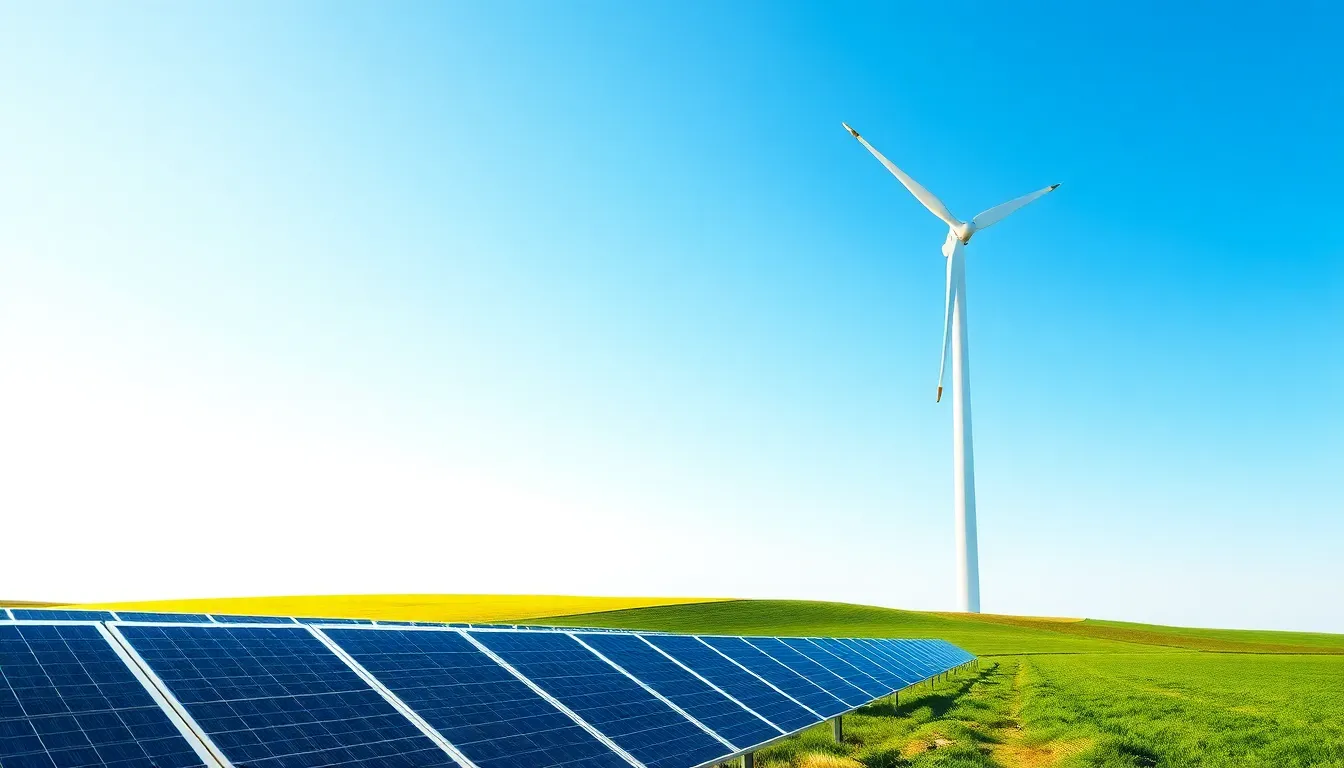In a world where the planet’s health is hanging by a thread, green tech innovation is like the superhero we never knew we needed. With a cape made of recycled materials and gadgets powered by sunshine, these cutting-edge solutions are turning the tide against climate change. From solar panels that look cooler than your favorite band’s album cover to electric cars that make you feel like you’re driving the future, green tech is redefining what it means to be eco-friendly.
But it’s not just about saving the planet; it’s about saving your wallet too. Imagine cutting your energy bill while saving the environment—sounds like a win-win, right? Dive into the world of green tech innovation, where creativity meets sustainability, and discover how these groundbreaking advancements are paving the way for a cleaner, greener future.
Table of Contents
ToggleOverview of Green Tech Innovation
Green tech innovation encompasses a wide range of technologies aimed at reducing environmental impact and enhancing sustainability. Solar energy solutions represent one of the forefronts of this movement, providing renewable electricity while decreasing reliance on fossil fuels. Electric vehicles, frequently touted for their energy efficiency, contribute significantly to lowering greenhouse gas emissions from transportation.
Innovation in materials plays a crucial role as well. Biodegradable materials and sustainable alternatives to plastics are gaining traction. These advancements not only minimize waste but also enhance consumer awareness regarding sustainable choices. Smart technology, including energy-efficient appliances and intelligent building systems, optimizes resource use and encourages conservation.
In the agricultural sector, precision farming techniques leverage technology to increase yield while reducing chemical inputs. These methods utilize drones, sensors, and data analysis, ensuring crops receive the right amount of nutrients and water. Furthermore, vertical farming introduces efficient land use, offering fresh produce in urban areas with limited space.
Waste management also benefits from green tech innovation. Composting technologies and waste-to-energy systems transform organic waste into valuable resources. This not only diverts waste from landfills but also generates renewable energy, promoting a circular economy approach.
Governments and businesses increasingly embrace green tech as an avenue for economic growth. Investments in sustainable technologies create job opportunities and drive innovation in local economies. As green tech continues to evolve, it sets a foundation for long-term ecological balance while supporting consumer needs and financial savings.
Key Areas of Green Tech Innovation
Innovations in green technology focus on energy efficiency and sustainability. Several key areas significantly contribute to environmental preservation.
Renewable Energy Solutions
Solar power stands out as a leading renewable energy source, providing clean electricity with decreasing costs. Wind energy follows closely, utilizing turbines to transform wind currents into power. Hydropower generates energy through water movement, offering a reliable alternative. Geothermal technology harnesses heat from the Earth’s core, ensuring consistent energy supply. Advanced battery storage systems enhance energy reliability, allowing for efficient use of renewable sources during peak demand. These solutions support a shift away from fossil fuels, driving substantial reductions in greenhouse gas emissions.
Sustainable Materials and Products
Biodegradable plastics serve as a game-changing alternative to traditional options, minimizing landfill waste. Recycled materials find new life in various products, promoting circular economy practices. Sustainable textiles made from organic or recycled fibers significantly reduce environmental impact within the fashion industry. Innovations in packaging, including compostable options, lessen plastic pollution. Emerging bioplastics derived from natural resources further enhance sustainability. Together, these sustainable materials offer consumers eco-friendly choices without sacrificing quality.
Energy Efficiency Technologies
Smart home devices optimize energy use, cutting waste and reducing utility bills. LED lighting proves more efficient than traditional bulbs, consuming less energy while providing greater luminosity. Energy-efficient appliances carry certifications, signifying superior performance and lower consumption. Building automation systems monitor and control energy use, maximizing efficiency in commercial spaces. Enhanced insulation and smart windows significantly reduce heating and cooling costs. These technologies ensure sustainable practices are feasible in everyday life.
Impact of Green Tech Innovation
Green tech innovation plays a crucial role in enhancing environmental sustainability while fostering economic benefits. This dynamic interplay between ecology and economy transforms industries and sets a new standard for future advancements.
Environmental Benefits
Green tech innovations yield significant environmental benefits. Solar energy solutions cut greenhouse gas emissions and harness clean energy from the sun. Electric vehicles replace traditional gasoline cars, which greatly reduces air pollution and reliance on fossil fuels. Biodegradable materials serve as alternatives to plastics, thus minimizing landfill waste and ocean pollution. Smart technology enhances resource efficiency, leading to lower water and energy usage. Precision farming practices utilize less chemical input while maximizing agricultural yields, contributing to food security. Collectively, these innovations aim to create healthier ecosystems and improve the overall quality of life.
Economic Growth and Job Creation
Green tech innovation fuels economic growth and job creation. The renewable energy sector, including solar and wind industries, creates millions of jobs while driving investment in local economies. Energy efficiency technologies reduce utility costs for consumers, allowing for increased spending in other areas. New markets for sustainable products emerge as consumers become more environmentally conscious. Governments facilitate growth through incentives and policies that promote green investments. Sustainable practices also enhance company competitiveness, attracting both consumers and investors. Overall, green technologies establish a robust economic foundation while positioning economies for a sustainable future.
Challenges in Green Tech Innovation
Green tech innovation faces significant hurdles that can impede growth and adoption. Identifying key challenges reveals critical areas needing attention.
Funding and Investment Issues
Accessing funding remains a major obstacle for green tech startups and projects. Investors often perceive high risks associated with emerging technologies. Limited financing opportunities can hinder the development of innovative solutions. Startups frequently struggle to secure venture capital or government grants necessary for scaling their businesses. Financial institutions may lack familiarity with green projects, causing hesitation in supporting these initiatives. Increased collaboration between investors and green tech innovators can bridge funding gaps, ensuring adequate resources are available for impactful technologies.
Regulatory and Policy Barriers
Navigating regulatory frameworks can prove challenging for green tech firms. Existing policies often lag behind technological advancements, creating uncertainty. Compliance with environmental regulations can become burdensome for startups, diverting resources from innovation. Policymakers might not prioritize or incentivize green tech solutions, further stifling growth. Unclear guidelines regarding emissions standards or renewable energy credits can create confusion. Establishing comprehensive policies that support green technologies encourages innovation and facilitates market entry, fostering a more sustainable future.
Conclusion
Green tech innovation stands at the forefront of the fight against climate change and environmental degradation. By embracing sustainable technologies, society can pave the way for a future that balances economic growth with ecological responsibility. The ongoing advancements in renewable energy, sustainable materials, and energy efficiency not only promise to enhance quality of life but also contribute to a healthier planet.
As challenges persist in funding and regulatory frameworks, the commitment to overcoming these obstacles is crucial. With continued support for green initiatives, the potential for transformative change remains strong. A collective effort towards embracing and investing in green technology will ensure a sustainable legacy for generations to come.





